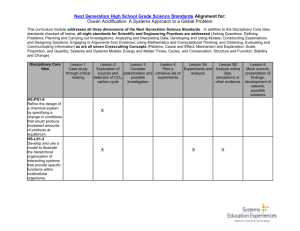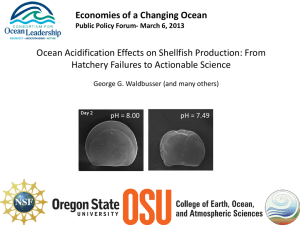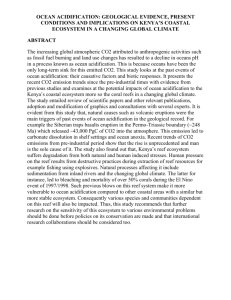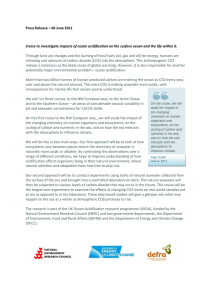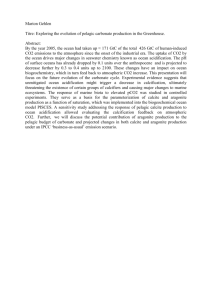Promoting International Collaboration on Ocean Acidification Data Management Eos
advertisement
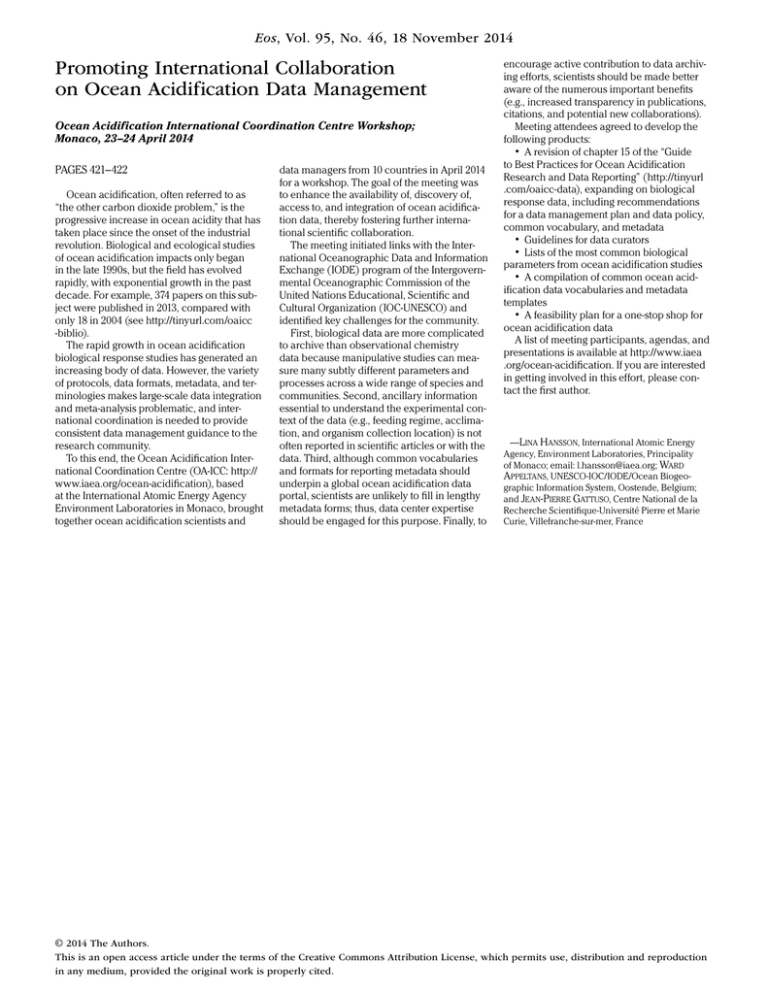
Eos, Vol. 95, No. 46, 18 November 2014 Promoting International Collaboration on Ocean Acidification Data Management Ocean Acidification International Coordination Centre Workshop; Monaco, 23–24 April 2014 encourage active contribution to data archiving efforts, scientists should be made better aware of the numerous important benefits (e.g., increased transparency in publications, citations, and potential new collaborations). Meeting attendees agreed to develop the following products: A revision of chapter 15 of the “Guide to Best Practices for Ocean Acidification Research and Data Reporting” (http://tinyurl .com/oaicc‐data), expanding on biological response data, including recommendations for a data management plan and data policy, common vocabulary, and metadata Guidelines for data curators Lists of the most common biological parameters from ocean acidification studies A compilation of common ocean acidification data vocabularies and metadata templates A feasibility plan for a one‐stop shop for ocean acidification data A list of meeting participants, agendas, and presentations is available at http://www.iaea .org/ocean‐acidification. If you are interested in getting involved in this effort, please contact the first author. • PAGES 421–422 Ocean acidification, often referred to as “the other carbon dioxide problem,” is the progressive increase in ocean acidity that has taken place since the onset of the industrial revolution. Biological and ecological studies of ocean acidification impacts only began in the late 1990s, but the field has evolved rapidly, with exponential growth in the past decade. For example, 374 papers on this subject were published in 2013, compared with only 18 in 2004 (see http://tinyurl.com/oaicc ‐biblio). The rapid growth in ocean acidification biological response studies has generated an increasing body of data. However, the variety of protocols, data formats, metadata, and terminologies makes large‐scale data integration and meta‐analysis problematic, and international coordination is needed to provide consistent data management guidance to the research community. To this end, the Ocean Acidification International Coordination Centre (OA‐ICC: http:// www.iaea.org/ocean‐acidification), based at the International Atomic Energy Agency Environment Laboratories in Monaco, brought together ocean acidification scientists and data managers from 10 countries in April 2014 for a workshop. The goal of the meeting was to enhance the availability of, discovery of, access to, and integration of ocean acidification data, thereby fostering further international scientific collaboration. The meeting initiated links with the International Oceanographic Data and Information Exchange (IODE) program of the Intergovernmental Oceanographic Commission of the United Nations Educational, Scientific and Cultural Organization (IOC‐UNESCO) and identified key challenges for the community. First, biological data are more complicated to archive than observational chemistry data because manipulative studies can measure many subtly different parameters and processes across a wide range of species and communities. Second, ancillary information essential to understand the experimental context of the data (e.g., feeding regime, acclimation, and organism collection location) is not often reported in scientific articles or with the data. Third, although common vocabularies and formats for reporting metadata should underpin a global ocean acidification data portal, scientists are unlikely to fill in lengthy metadata forms; thus, data center expertise should be engaged for this purpose. Finally, to • • • • —LINA HANSSON, International Atomic Energy Agency, Environment Laboratories, Principality of Monaco; email: l.hansson@iaea.org; WARD APPELTANS, UNESCO‐IOC/IODE/Ocean Biogeographic Information System, Oostende, Belgium; and JEAN‐PIERRE GATTUSO, Centre National de la Recherche Scientifique‐Université Pierre et Marie Curie, Villefranche‐sur‐mer, France © 2014 The Authors. This is an open access article under the terms of the Creative Commons Attribution License, which permits use, distribution and reproduction in any medium, provided the original work is properly cited.
